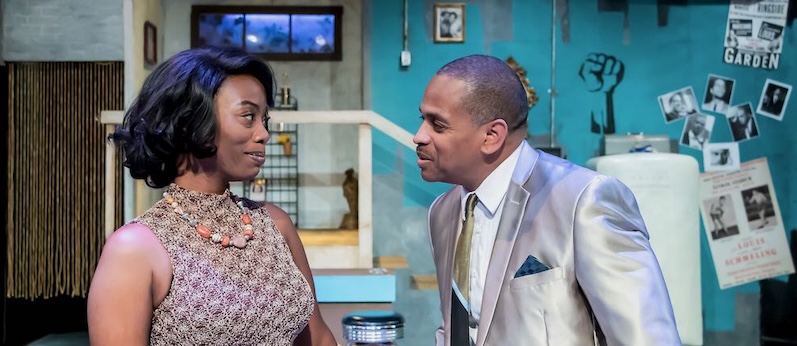
Alisha Elaine Anderson and Jonathan D. Wray (Photo by Mike Hardy)
Reviewed by G. Bruce Smith
Long Beach Playhouse
Through June 15
RECOMMENDED
For those of us of a certain age — or for the younger crowd that knows its American history —the Detroit riot of 1967 was one of the bloodiest of the urban riots. It was mainly a confrontation of Black residents and Detroit police, and it resulted in 43 deaths, 1,189 injured, over 7,200 arrests, and more than 400 buildings destroyed
Thus, it comes as no surprise that Dominique Morriseau’s Detroit ’67, the latest offering at the Long Beach Playhouse, will somehow involve the riot. And it is also fitting to the time, place and the play’s narrative that Motown music, by 1967 a hugely successful record label based in Detroit, is featured in the show.
However, though the riot has a role in Detroit ’67, the play is ultimately grounded in a loving —if somewhat contentious — relationship between an adult sister and brother. And it is about being on the cusp of change, both for the characters and for America.
Chelle (Alisha Elaine Anderson) and her brother Lank (Marc Morris) are living in their childhood home (their parents have since died) in what is described as “the ghetto” in Detroit. They’ve recently inherited a modest sum from their parents, but they also run an underground bar/dance club on the weekends to earn some extra money. Helping the siblings out is their good friend Bunny (Cassandra Carter-Williams), who provides some comic relief but also shows great insight into the Chelle-Lank relationship.
Lank is the dreamer, the one who wants to take their inheritance and, with his best friend Sylvester (Jonathan D. Wray), buy a legitimate bar with a license to operate it. Chelle is more conservative; she simply wants to put aside some of the inheritance money for her adult son and have a home. And so, they are at odds with one another.
Into this tension between siblings comes a mysterious young white woman, Caroline (Allison Lynn Adams). Lank and Sylvester have taken her in when they spotted her, bruised and bloodied, in a rough neighborhood. Caroline ends up staying with Chelle and Lank, helping out at the underground parties until she can get enough money to leave Detroit. However, she is vague about her past, at least initially.
The riot – right in the neighborhood – starts at the end of Act I, coinciding with an action that Lank and Sylvester feel compelled to take, which puts them on a dangerous course of confrontation with Detroit police.
In Act II, the riot continues outside their door, even as complex issues simmering just below the surface come out in compelling ways. Are the lines between Black and White clearly drawn, as Chelle believes — or can they be blurred, as Caroline asserts? What good does it do for a Black person to have dreams when they will just be shot down by the White power structure? And is there any hope for change?
The use of Motown songs throughout the show serves not only as a fitting “time and place” marker, but also as a reflection of the action onstage. In addition, the use of the Motown sound is somewhat ironic because, while it integrated listening audiences, it couldn’t loosen racial prejudice.
Director Robyn Hastings and the talented cast bring the story to life in a grounded, naturalistic way. And everything from the authentic costumes (Christina Bayer) — which include a daishiki in one scene — to the sound design (Jessica Rivera) — which not only includes Motown music but also haunting police car sirens and more — take the audience into Detroit in 1967.
Of the questions posed in Detroit ’67, the one that has a fairly clear answer by the end of the play is whether change can occur. The answer is yes, and is symbolized (with a touch of tongue-in-cheek) by Chelle’s willingness to give up her scratchy record player and embrace the latest in technology, the 8-track player, that her brother has brought into the home.
And regardless of whether or not changes nationally in 1967 solved all the issues of police harassment, injustice and oppression, Detroit ’67 gives us hope for Chelle, Lank and, by extension, dreamers everywhere.
Long Beach Playhouse, 5021 E. Anaheim St., Long Beach; Fri.-Sat., 8 pm., Sundays 2 pm; lbplayhouse.org. Running time: two hours and 15 minutes with an intermission.











